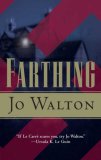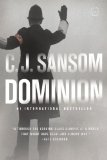Summary | Excerpt | Reviews | Beyond the book | Read-Alikes | Genres & Themes | Author Bio

Critics' Opinion:
Readers' Opinion:
First Published:
Aug 2006, 320 pages
Paperback:
Aug 2007, 320 pages
 Book Reviewed by:
Book Reviewed by:
BookBrowse Review Team
Buy This Book
At first glance Farthing appears to be a
typical country house mystery - the setting is the South of
England, close to the market town of Winchester and everyone is
well spoken and properly dressed; but don't be fooled - the
storyline quickly blasts through the confines of a "cozy"
mystery to explore many themes including politics, justice and
class, but most importantly, through the vehicle of alternate
history, the nature of history itself and how we must never be
complacent about the future, because history can and does turn
on a dime, or in this case a farthing*.
Within a few pages the reader becomes aware that all is not as
it should be in England's green and pleasant land. It's 1949 and
the war is over - but it's been over since 1941 because Britain
made peace with Germany, leaving Hitler to rule Europe.
Churchill has long been sidelined to the back benches, the worst
aspects of the British class system are flourishing, and
ultra-conservatives with aspirations of becoming full-blown
fascists, like their admired neighbor across the Channel, are in
control of the government. Meanwhile, on the other side of the
Atlantic, Nazi-sympathizer Charles Lindbergh is President,
leaving Canada as one of the few safe-havens for European Jews.
The story is told from two perspectives; firstly by Lucy,
the apparently scatterbrained daughter of the house, married to
Jewish David; Lucy constantly puts herself down in a way that is
quintessentially English - a persona still to be found in many
bright English women who have become habituated to hiding their
intelligence (even from themselves) for fear of being thought
too clever. The other viewpoint is that of Inspector
Carmichael of Scotland Yard who is nobody's fool and has his own
axe to grind. As the events unfold from the different
perspectives of Carmichael and Lucy it is as if a movie camera
is zooming out - first the focus is on the Farthing estate, but
slowly the lens draws back to give us a wider view of events,
and their sinister implications.
This is a fine, thought provoking book, easily on a par with
Philip Roth's
The Plot Against America.
*A farthing (meaning fourth part) was legal tender in Britain until 1960, and was worth one quarter of a penny. Up until 1971, when Britain's currency was decimalized, there were 12 pennies to a shilling, 20 shillings to the pound, and five shillings to the crown - thus 240 pennies in a pound.
![]() This review was originally published in The BookBrowse Review in September 2006, and has been updated for the
September 2007 edition.
Click here to go to this issue.
This review was originally published in The BookBrowse Review in September 2006, and has been updated for the
September 2007 edition.
Click here to go to this issue.

If you liked Farthing, try these:

by Guy Saville
Published 2015
The explosive new thriller of a world that so nearly existed

by C.J. Sansom
Published 2014
C.J. Sansom rewrites history in a thrilling novel that dares to imagine Britain under the thumb of Nazi Germany.





The Flower Sisters
by Michelle Collins Anderson
From the new Fannie Flagg of the Ozarks, a richly-woven story of family, forgiveness, and reinvention.

The House on Biscayne Bay
by Chanel Cleeton
As death stalks a gothic mansion in Miami, the lives of two women intertwine as the past and present collide.

The Funeral Cryer by Wenyan Lu
Debut novelist Wenyan Lu brings us this witty yet profound story about one woman's midlife reawakening in contemporary rural China.
Your guide toexceptional books
BookBrowse seeks out and recommends the best in contemporary fiction and nonfiction—books that not only engage and entertain but also deepen our understanding of ourselves and the world around us.